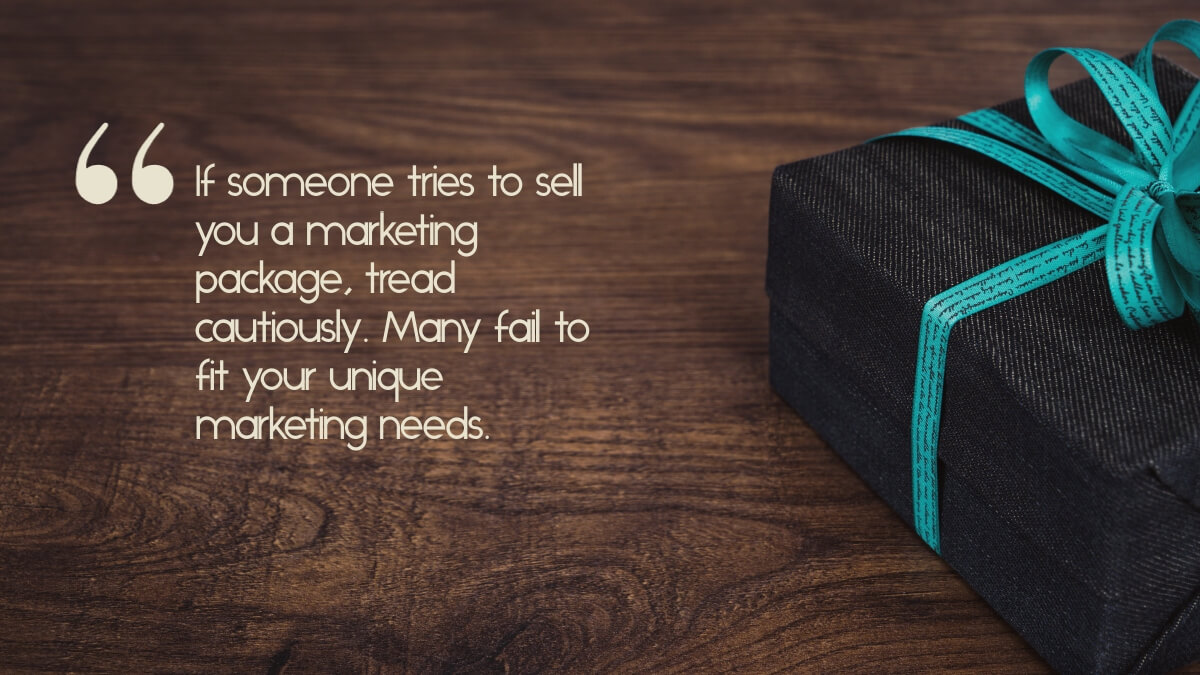Small Business Marketing Packages: Approach with Caution

We’ve all come across them: the AMAZING marketing package deals. You know what we mean; they promise to get your company/product in front of thousands of potential buyers with one easy package. Sometimes they come with a pretty steep price tag, but they sound like such a sure-fire thing that many of us end up taking the plunge and spending thousands of dollars… or sometimes they seem so inexpensive you’d be stupid not to try it out.
But wait. Would you?
It’s our (hard-won and painful) experience that marketing “package deals” rarely pay off, leaving us always frustrated, usually angry, and often with a depleted marketing budget.
See, good marketing strategies look at your specific needs: what your marketing goals are, what your budget is, and who you’re trying to reach, and build a plan around those parameters. Unfortunately, marketing packages start at the other end of the equation: they have something to sell, and they are looking for people to sell it to.
They have, as we say, a solution looking for a problem.
If it just happens that their marketing package fits your marketing goals just fine, then they are a great choice. But if you aren’t the square peg for their square hole, why in the heck would you spend your money on them?
It’d be impossible to put together a comprehensive list of all the different marketing packages that are out there, but the following are a few of the fairly common deals we’ve seen. Bear in mind that these are not always necessarily bad in and of themselves. Some of the packages we’ve seen can be good complements to a well-rounded marketing plan. The trouble usually comes in when we decide to make these the centerpiece of our marketing plan, or worse, our only marketing plan.
Some marketing packages to be wary of:
- Online packages that include social media marketing, on-site advertising, and broadcast media: We hear about these a lot from clients. They are usually radio and TV stations who sell packages for one low price—often a really, really low price. They tell you that you will get placement on their website, a set number of posts on their social media pages, and on-air/on-screen mentions of your company. Sounds awesome right? The biggest issue with these sorts of deals usually lies with the relatively low traffic or poor targeting of these websites and social media pages. Having your brand showcased on their home page for a whole month sounds great… until you realize that their site doesn’t get much traffic—or none of the traffic they get is your target audience. And as far as the on-air/on-screen placement goes, not all times are equal. Savvy media buyers don’t buy or measure anything by the number of times a spot will air. They’re more interested in concrete numbers for the type of audience you’ll be reaching and the time of day your spots will air. To illustrate a bit, there’s a big difference between being guaranteed 50 spots that end up running at 2 AM on the basket-weaving channel and being guaranteed to reach 300,000 of your ideal target audience during an NFL game.
- TV Infomercials or ad/media packages: If you’re selling a product, chances are you’ve come across a pitch for these. They usually consist of two main components: a production piece and a media buy. You’ll be offered either a segment in a 30-minute infomercial or the entire 30-minute infomercial, with the company providing all video production, hosting, scripting, etc. In addition, you’ll be guaranteed a number of spots (times that your infomercial will air). These often have fairly significant price tags—one we recently saw was asking for $50,000—but they sound really good, because your infomercial will be shown a huge number of times, and at the end of the production, you’ll be given a copy of the spot that you can then use for your own promotional purposes (posting on your website, social media, etc.). So why are we throwing up a red flag on these? Well, like many things in life, the devil is in the details. Once again, if those spots are running at 2 AM, or on a channel that isn’t watched by the customers you want to reach, you are wasting your money. The other issue with these types of packages is that you usually end up with some pretty heavy restrictions on what you can do with “your” spot after it airs.
- Conferences and trade shows: yep, this is a common one. A trade show promoter reaches out and tells you that for “just” a few thousand dollars you can get your logo on their promotional materials and their website, a booth on the main concourse, and, in some cases, a “speaking opportunity” at the conference. You’ve got platinum, gold, and silver sponsorship opportunities, all with a different price tag. Why not, you ask? Well, in some cases, trade shows are a great opportunity to showcase a product, especially if the people coming to the show all fit your customer profile. But remember, you’re crammed in there with a whole bunch of other people, all selling to the same audience. It’s not exactly a blue ocean marketing effort—and just imagine how much digital marketing (say, search marketing, or Facebook ads) you could run for the same price. Also, just a word to the wise? Just slapping your logo on something is a really ineffective way to get your customers’ attention.
As I mentioned, these are only a few examples of the many, many marketing packages that might find their way into your inbox at some point in the future. And since we can’t always be there to run things by (or can we?? – we actually can!), here are a few of the key questions I like to ask regarding “package deals/sponsorships” to determine whether they’re worth the investment:
How to Vet Marketing Package Offers:
- “Does this sound too good to be true?” As in other areas in life, this is always a good question, but when it comes to marketing proposals, this is the first thing to ask. Remember, the people making the proposal to you ARE MARKETERS. It’s their job to make their package sound like the most amazing thing ever. Make sure to ask a lot of questions and look for potential pitfalls, such as:
- “How big is the audience that will be exposed to my message, and who are they?” Marketing is a numbers game: you want to get your message in front of as many people as possible, provided they are the RIGHT people. If you’re selling a revolutionary beard trimmer, but the package someone’s trying to sell you has a 95% female audience, that’s probably not a great fit. Often package deals pay little or no attention to who your specific target market is, with dire consequences. (BTW, if you want to learn how to identify your target market, check this out).
- “When will my message be seen?” A lot of package deals make use of remnant media, meaning your spots will air or your ads will show in whatever leftover, unclaimed time slots are available. So make sure all your spots/ads aren’t going to run at 3 AM Sunday morning (unless you’re selling an insomnia cure!).
- “What reporting will you provide during the time the package is running and after it’s completed?” If someone is uncomfortable providing you concrete reporting and metrics on what they’re asking you to sign up for, that’s a big red flag. Reputable partners will be more than happy to provide proof that their deal was a good one for you. The same holds true for specific information on who, when, and where their media buys are.
Like many things in life, a little common sense goes a long way. Trust your intuition, keep a firm eye on your marketing goals and who your customers are, and you’ll generally be able to avoid a lot of pain and wasted spend.
Happy small business marketing!
Theron & Katie

